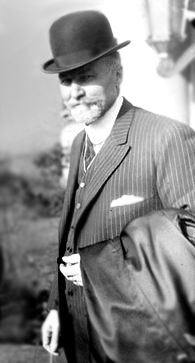John Benjamin Murphy
| John Benjamin Murphy | |
|---|---|

Murphy outside Mercy hospital, Theodore Roosevelt's hospital after an October 14, 1912 assassination attempt (1912-10-18)
|
|
| Born | December 21, 1857 Appleton, Wisconsin |
| Died | August 11, 1916 (aged 58) Mackinac Island, Michigan |
| Residence | Chicago, Illinois |
| Nationality | United States |
| Institutions |
Mercy hospital, Chief of Staff Rush Medical College College of Physicians and Surgeons Northwestern University Medical School Cook County Hospital Graduate Medical School of Chicago |
| Alma mater | Rush Medical College, 1879 |
| Known for | President, American Medical Association artificial pneumothorax appendectomy |
| Influences | Christian Fenger, Theodor Billroth |
| Notable awards | Order of St. Gregory the Great |
| Signature | |
John Benjamin Murphy, born John Murphy (December 21, 1857 in Appleton, Wisconsin – August 11, 1916 Mackinac Island, Michigan), was an American physician and abdominal surgeon noted for advocating early surgical intervention in appendicitis appendectomy, and several eponyms: Murphy’s button,Murphy drip,Murphy’s punch, Murphy’s test, and Murphy-Lane bone skid. He is best remembered for the eponymous clinical sign that is used in evaluating patients with acute cholecystitis. His career spanned general surgery, orthopedics, neurosurgery, and cardiothoracic surgery, which helped him to gain international prominence in the surgical profession.Mayo Clinic co-founder William James Mayo called him "the surgical genius of our generation".
Over the course of his career he was renowned as a surgeon, a clinician, a teacher, an innovator, and an author. In addition to general surgical operations, such as appendectomy, cholecystostomy, bowel resection for intestinal obstruction, and mastectomy, he performed and described innovative procedures in neurosurgery, orthopedics, gynecology, urology, plastic surgery, thoracic surgery, and vascular surgery. He also ventured into techniques such as neurorrhaphy, arthroplasty, prostatectomy, nephrectomy, hysterectomy, bone grafting, and thoracoplasty.
...
Wikipedia
